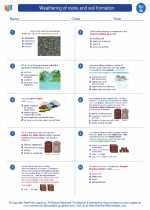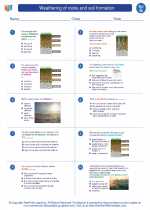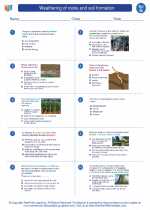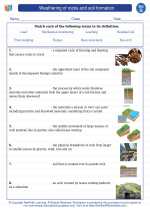Weathering of rocks and soil formation -> treatment
Treatment in Science
Treatment in science refers to the application of any method, technique, or process designed to bring about a desired result or change in a system or organism. In various scientific fields, treatment can refer to a wide range of interventions, including medical treatments for diseases, environmental treatments for pollution, and experimental treatments in research studies.
Types of Treatments
In the field of science, treatments can be categorized into several types:
- Medical Treatments: These include pharmaceutical interventions, surgical procedures, and other medical interventions aimed at preventing, curing, or managing diseases and health conditions.
- Environmental Treatments: These involve methods for addressing pollution, waste management, and habitat restoration to improve the health of ecosystems and living organisms.
- Experimental Treatments: In research studies, experimental treatments are often used to test new drugs, therapies, or interventions to assess their efficacy and safety.
- Behavioral Treatments: These treatments focus on modifying behaviors to achieve desired outcomes, such as in psychology or behavioral ecology studies.
Factors Affecting Treatment Efficacy
When evaluating the effectiveness of a treatment, several factors need to be considered:
- Dosage or Exposure: The amount and duration of treatment can significantly impact its effectiveness. In medical treatments, the correct dosage of medication is crucial, while in environmental treatments, the duration and intensity of exposure to the treatment are important.
- Individual Variability: Different individuals or systems may respond differently to the same treatment. Genetic factors, environmental influences, and pre-existing conditions can all affect how a treatment is received and its overall efficacy.
- Side Effects: Many treatments can have unintended side effects, which need to be carefully monitored and managed. Understanding the potential risks and benefits of a treatment is essential in evaluating its efficacy.
- Environmental Conditions: In environmental treatments, factors such as temperature, humidity, and the presence of other substances can influence the effectiveness of the treatment.
Applications of Treatment in Science
The concept of treatment is widely applicable in various scientific disciplines:
- Medicine and Healthcare: The development and application of medical treatments are fundamental to the practice of modern medicine, including pharmaceuticals, surgeries, and therapies for various diseases and conditions.
- Environmental Science: Treatments are used to address pollution, restore ecosystems, and manage natural resources to mitigate environmental damage and protect biodiversity.
- Experimental Research: In scientific studies, treatments are often used to test hypotheses, evaluate interventions, and measure the effects of specific variables on a system or organism.
- Psychology and Behavioral Studies: Behavioral treatments are utilized to modify behaviors, address mental health conditions, and study the impact of environmental and social factors on human behavior.
Study Guide for Treatment in Science
When studying the concept of treatment in science, consider the following key points:
- Define treatment and explain its significance in various scientific disciplines.
- Identify different types of treatments and provide examples of each type.
- Discuss the factors that can affect the efficacy of a treatment, including dosage, individual variability, side effects, and environmental conditions.
- Examine the applications of treatment in the fields of medicine, environmental science, experimental research, and behavioral studies.
- Consider ethical considerations related to the use of treatments in scientific research and practice.
By understanding the concept of treatment and its diverse applications, you can gain insights into the role of interventions in promoting health, managing environmental issues, and advancing scientific knowledge.
[Treatment] Related Worksheets and Study Guides:
.◂Science Worksheets and Study Guides Seventh Grade. Weathering of rocks and soil formation

 Activity Lesson
Activity Lesson
 Worksheet/Answer key
Worksheet/Answer key
 Worksheet/Answer key
Worksheet/Answer key
 Worksheet/Answer key
Worksheet/Answer key
 Worksheet/Answer key
Worksheet/Answer key
 Vocabulary/Answer key
Vocabulary/Answer key
 Vocabulary/Answer key
Vocabulary/Answer key
 Vocabulary/Answer key
Vocabulary/Answer key
 Vocabulary/Answer key
Vocabulary/Answer key
